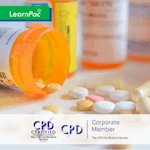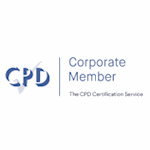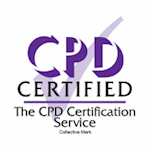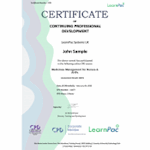Medicines Management for Nurses & AHPs - Level 3 - Online Course - CPD Accredited
CPDUK Accredited | Instant Course Access | Includes Assessment & Certificate | Instant Certificate Download
LearnPac Systems
Summary
- Certificate of completion - Free
- Exam(s) / assessment(s) is included in price
- Tutor is available to students
Add to basket or enquire
Overview
Medicines Management for Nurses & AHPs - Level 3 - Online Course - CPD Accredited.
Welcome to our online Medicines Management for Nurses and AHPs training course for front-line healthcare and social care providers.
Medicines management involves the safe and cost-effective use of medicines in clinical practice, with maximum patient benefits while minimising potential harm. Medicines need to be prescribed and administered correctly within the recommended framework for safe practice in medicines management. This online medicines management course was developed for registered nurses and allied health professionals (AHPs).
Certificate duration: 2 years
Entry requirements: No entry restrictions
Recommended prerequisites: N/A
Assessment type: End of course assessment
Assessment pass mark – 80% needed to pass and gain a CPD certificate
Cost(s) of assessment and certification – All costs included in the course price
Awarding/Accrediting body – CPD Certification Service (CPDUK)
Medicines Management for Nurses & AHPs - Level 3 - Online Course - CPD Accredited.
CPD
Course media
Description
Course aims
The aim of this online Medicines Management for Nurses and AHPs training course is to improve healthcare professionals’ awareness of the fundamental principles for the safe handling and administration of medicines.
Learning outcomes
On completion of this online Medicines Management for Nurses and AHPs training course, learners will be able to:
- Describe how the law affects the way practitioners can manage and administer medicines,
- Define some medical and technical terms,
- Understand the effect of age on the body and its impact on medications,
- Know the different types of medicines,
- Develop the knowledge, skills and attitudes to administer medicines within the health and care settings competently,
- Identify the need for accurate written documentation and audit in the safe handling of medication,
- Identify how to deal with special requirements such as “when required” medications and controlled drugs,
- Explain the importance of labels and prescriptions of medicines,
- Explain how drugs act on the body and major organs,
- Recognise some side effects and adverse drug reactions of prescribed medicines,
- Describe and know how to deal with side effects, adverse drug events and drug interactions, and
- Ensure best practice is followed for the supply, storage of medicines within the care setting.
Why is online Medicines Management for Nurses and AHPs training critical?
Did you know?
- One-quarter of the population has a long-term condition
- One-quarter of people over 60 have two or more long-term conditions
- With an ageing population, the use of multiple medicines (known as polypharmacy) is increasing
- Between 30-50% of drugs prescribed for long-term conditions are not taken as intended.
What is covered in this course?
This online Medicines Management for Nurses and AHPs training course includes the following:
- Unit 1 – Introduction
- Statistics and figures relating to medicines
- Key definitions:
- The therapeutic index of a drug
- Therapeutic drug dose
- Toxic drug dose
- The drug dosage margin
- Problem drugs
- The half-life of a drug
- Maximising the known half-life of a drug
- The steady-state of a drug
- Drug potency
- Comparing drug potency
- Unit 2 – Legislation and regulations
- Relevant legislation
- The Medicines Act 1968
- Misuse of Drugs Act 1971
- Penalties under the Act
- Class A drugs
- Class B drugs
- Class C drugs
- The Misuse of Drugs (Safe Custody) Regulations 1973
- Misuse of Drugs Regulations 2001
- Responsible Pharmacist Regulations 2009
- The accountable officer
- Controlled Drugs (Supervision of Management and Use) Regulations 2006
- Health and Safety at Work, etc. Act 1974
- So far as is reasonably practicable
- Regulations, Guidance and Approved Codes of Practice
- The Health and Safety Executive (HSE)
- The HSE’s duties
- HSE and health and social care services
- Care Standards Act 2000
- Public Services Reform (Scotland) Act 2010
- Hazardous Waste Regulations 2005
- Mental Capacity Act 2005
- The five MCA principles
- Independent Mental Capacity Advocate (IMCA)
- Adults with Incapacity (Scotland) Act 2000
- Safer Management of Controlled Drugs Regulations 2006
- Response to the Shipman Inquiry’s Fourth Report
- Health and Social Care Act 2008 (Regulated Activities) Regulations 2010
- NICE guidance for managing medicines in care homes
- Key recommendations from NICE guidance
- Health and social care regulations for UK countries
- Health and social care regulation in England
- Health and social care regulation in Scotland
- Health and social care regulation in Wales
- Health and social care regulation in Northern Ireland
- Royal Pharmaceutical Society of Great Britain
- Nursing and Midwifery Council (NMC)
- Relevant legislation
- Unit 3 – Understanding medicines and prescriptions
- Key definitions
- The Medicines and Healthcare Products Regulatory Agency (MHRA)
- Licensing
- British National Formulary
- The MHRA and borderline products
- Categories of Medicines
- Controlled drug schedules
- Names of medicines
- Drugs – Mechanism of action
- How medicines act on the body
- Pathology and physiology
- Side effects and adverse drug reactions
- What is an Adverse Drug Reaction?
- Drugs commonly involved in ADRs
- High-risk patient groups
- Reporting adverse drug events
- The Yellow Card reporting system
- Black Triangle Drugs
- How to identify an ADR
- Types of adverse drug reactions
- How to reduce ADRs
- Drug interactions
- Drugs commonly involved in interactions
- Ageing and medication
- Professional responsibilities and accountability
- Adherence to policies and procedures
- Unit 4 – Prescription and administration of medicines
- Who can prescribe?
- Independent prescribers
- Supplementary prescribers
- Types of prescriptions
- Community prescriptions
- The validity of a prescription
- The front of the prescription
- The back of the prescription
- Inpatient prescriptions
- Private prescriptions
- Patient Group Directives (PGD)
- Dispensing labels
- Administering the medicine
- Patient information leaflets
- The role of the pharmacist
- Homely Remedies/Symptomatic Relief Protocol (SRP)
- Who can prescribe?
- Unit 5 – Methods of administering medications
- Five rights of medication administration
- Administration frequency
- Time of administration
- Administration with, before and after food
- Other directions
- Medication routes
- Systemic medications
- Rectal and parenteral systemic medications
- Topical medications
- Topical steroids
- Unit 6 – Safe administration of medicines
- Categories for medicines administration
- Self-administration
- Part-administration
- Full-administration
- Drug calculations
- Unit conversions
- Tablet conversions
- Half-tablets
- Liquid calculations
- Rates of Infusion (through a pump)
- Rates of Infusion (drops per minute)
- References and resources.
Medicines Management for Nurses & AHPs - Level 3 - Online Course - CPD Accredited.
Who is this course for?
This online Medicines Management for Nurses and AHPs training course was developed for frontline healthcare professionals, including:
- Registered nurses and midwives,
- Allied health professionals (AHPs),
- Nursing associates, and
- Senior health and social care support workers.
Medicines Management for Nurses & AHPs - Level 3 - Online Course - CPD Accredited.
Requirements
Learn anywhere, anytime on any device.
You will need access to a desktop computer, laptop, tablet or smartphone device to complete these online courses. You can start, pause/stop and return to where you left off.
Our courses utilise responsive design features, making them available on any device of your choice.
Medicines Management for Nurses & AHPs - Level 3 - Online Course - CPD Accredited.
Career path
Our online courses and programmes range from introductory modules at Level 1 (awareness/beginner) to advanced and expert modules up to Level 6.
Our e-learning modules count towards CPD hours for professionals in various sectors as well as meeting mandatory and statutory requirements (where relevant).
Medicines Management for Nurses & AHPs - Level 3 - Online Course - CPD Accredited.
Questions and answers
Currently there are no Q&As for this course. Be the first to ask a question.
Certificates
Certificate of completion
Digital certificate - Included
Reviews
Currently there are no reviews for this course. Be the first to leave a review.
Legal information
This course is advertised on reed.co.uk by the Course Provider, whose terms and conditions apply. Purchases are made directly from the Course Provider, and as such, content and materials are supplied by the Course Provider directly. Reed is acting as agent and not reseller in relation to this course. Reed's only responsibility is to facilitate your payment for the course. It is your responsibility to review and agree to the Course Provider's terms and conditions and satisfy yourself as to the suitability of the course you intend to purchase. Reed will not have any responsibility for the content of the course and/or associated materials.





